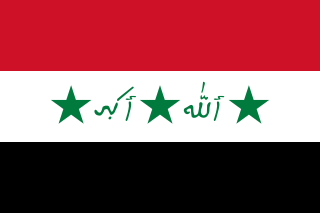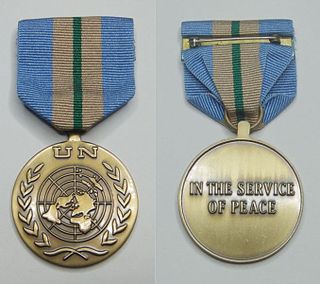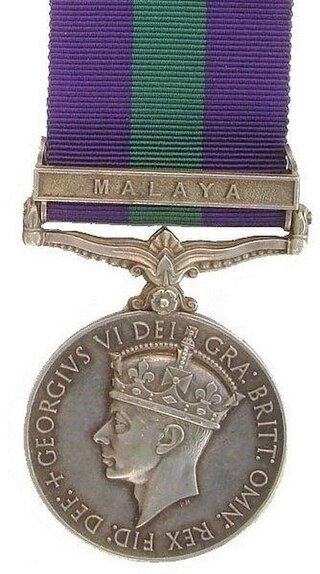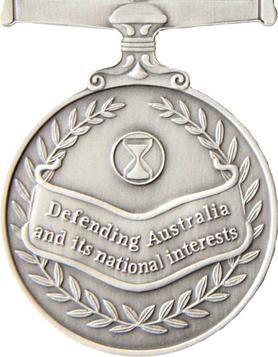
The Coalition Provisional Authority was a transitional government of Iraq established following the invasion of the country on 19 March 2003 by the U.S.-led Multinational Force and the fall of Ba'athist Iraq.
The Armed Forces Service Medal (AFSM) is a military award of the United States military that was created on January 11, 1996, by President Bill Clinton under Executive Order 12985. The AFSM is a deployed service medal that is presented to those service members who engage in "significant activity" for which no other U.S. campaign or service medal is authorized.

A United Nations Medal is an international decoration awarded by the United Nations (UN) to the various world countries members for participation in joint international military and police operations such as peacekeeping, humanitarian efforts, and disaster relief. The medal is ranked in militaries and police forces as a service medal. The United Nations awarded its first medal during the Korean War (1950–1953). Since 1955, many additional United Nations medals have been created and awarded for participation in various United Nations missions and actions around the world.
The NATO Medal is an international military decoration which is awarded to various militaries of the world under the authority of the North Atlantic Treaty Organization (NATO). It is manufactured by Eekelers-Centini Intl, of Hemiksem, Belgium.

The Australian Active Service Medal (AASM) is an Australian military decoration. It was authorised on 13 September 1988 to recognise prescribed service in "warlike" operations, backdated to February 1975. It is awarded with a clasp to denote the prescribed operation and subsequent awards of the medal are made in the form of additional clasps. In 2012, it was announced that the medal would no longer be issued for future operations, with the AASM and the Australian Service Medal being replaced by the Australian Operational Service Medal.

The Gulf War Medal was a campaign medal approved in 1992, for issue to officers and men of British forces who served in Kuwait and Saudi Arabia during Operation Granby in 1990–91.

The Iraq Medal was authorised on 23 February 2004. It was a campaign medal issued to members of the British Armed Forces and certain attached personnel, who served between 20 January 2003 and 22 May 2011 on, or in support of, Operation Telic - the designation for British operations during the 2003 Invasion of Iraq and its aftermath.

The Operational Service Medal for Sierra Leone is a campaign medal established in 2000 by the Ministry of Defence of the United Kingdom for participation in the British military intervention during and after the Sierra Leone Civil War, from May 2000 to July 2002.

The Operational Service Medal for Afghanistan is a campaign medal previously awarded by the Ministry of Defence of the United Kingdom for service by British Armed Forces personnel in support of the post-2001 Afghan War.

The Operational Service Medal for the Democratic Republic of the Congo is a British armed forces campaign medal, awarded mostly to military personnel who served between 14 June and 10 September 2003 on Operation Coral.

The General Service Medal was instituted to recognise service in minor Army and Royal Air Force operations for which no separate medal was intended. Local forces, including police, qualified for many of the clasps, as could units of the Indian Army prior to 1947.

The General Service Medal, is a campaign medal of the United Kingdom introduced in 1962 to replace both the General Service Medal (1918), as awarded to the Army and RAF, and the Naval General Service Medal (1915). The 1962 GSM was awarded until 2007, when it was replaced by the Operational Service Medal. In 2015 the General Service Medal (2008) was introduced.

The Humanitarian Overseas Service Medal is an award in the Australian honours system. The award is presented to those who perform humanitarian service in a foreign country, in particular those working in dangerous environments or conditions or during a humanitarian crisis. The award was introduced by letters patent on 16 April 1999, following a review of the Australian honours and awards system beginning in 1995.

The Korea Medal, sometimes referred to as the Queen's Korea Medal to distinguish it from the United Nations Service Medal, is a campaign medal created in 1951 to recognize troops from Australia, Canada, New Zealand, and the United Kingdom who had given either one day's service in an air sortie over Korea, or 28 days service offshore, during the Korean War. The medal was identical in all countries where it was awarded, except for Canada where it contained unique elements. An award distributed across the Commonwealth, the Korea Medal holds a different place in each country's order of precedence for honours.

The Civilian Service Medal (Afghanistan) is awarded by the British government to civilians (and members of the UK Armed Forces in certain non-combat roles) to recognise service since 19 November 2001 in the transition to democracy in Afghanistan.

The Australian Operational Service Medal is a campaign medal established on 22 May 2012 to recognise service by Australian Defence Force (ADF) personnel on designated hazardous operations. It may also be awarded to civilians who serve alongside the ADF on designated operations under specific conditions.

The Iraq Commitment Medal is a military campaign award that was created on June 11, 2011, by the Government of Iraq. The medal was offered to United States and Coalition veterans of the Iraq War in a letter to the United States Secretary of Defense. The award has not been officially approved for acceptance or wear by the United States or other coalition partner governments, being still in the "Pending Approval" status. In 2013, the Department of Defense made a statement that it is still waiting for the initial group of medals to be received from the Government of Iraq. This award was presented to then-Vice President Joe Biden on December 1, 2011.

The Ebola Medal for Service in West Africa, known simply as the Ebola Medal, is a service medal for issue to the Armed Forces and to civilians, working either for Her Majesty's Government or for non-governmental organisations, in support of the British Government's response to the Ebola crisis in West Africa between March 2014 and March 2016. The medal is the first to be awarded by the UK Government for a humanitarian crisis response.
The Humanitarian Medal is a British award intended to recognise the efforts of those involved in providing aid and support to human welfare during or in the aftermath of a humanitarian crisis. The medal is awarded to people that have responded to emergencies both in the United Kingdom or overseas.
















